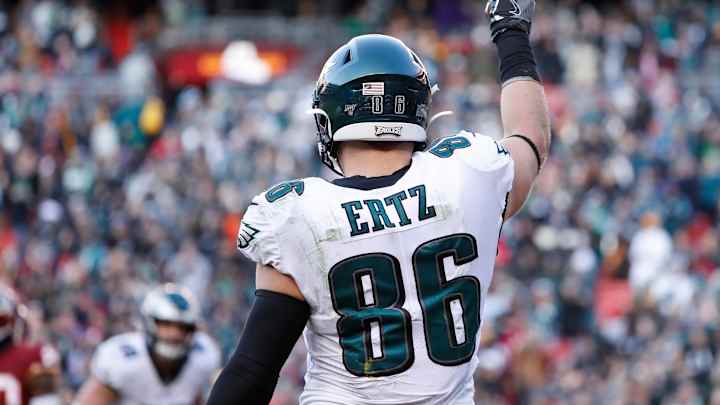Sure Bet Turns Murky for Zach Ertz

Extensions are always a give-and-take, especially with the Eagles.
Howie Roseman’s modus operandi has always been targeting core players early in an attempt to get team-friendly extensions done. The back end of that philosophy is the history of the NFL salary cap with trends showing that the price tag never comes down.
The “give” to Zach Ertz was not “taken” by the Pro Bowl tight end last season. Ertz, 29, turned down an extension offer and is set to count $12.4M against the salary cap over the final two years of his deal, with base salaries of $6.6M this year and $8.2 next season.
Ertz, probably smartly, bet on himself pre-coronavirus.
Consider that in this century alone the salary cap has gone from $62.172 million in 2000 to $188.2M by last season. And the rise was no EKG. Through two decades there wasn’t even one year that the cap went down, with the lone anomaly being the 2010 uncapped season because a prior collective bargaining agreement was expiring.
In the certainties of life, you could add gross NFL revenue to death and taxes.
As legendary pro wrestler Roddy Piper used to say, “Just when you think you have all the answers, I change the questions.”
No one in the business world was betting on a pandemic and the NFL and the NFLPA were no different.
Here we are, though, and there is a possibility the 2020 season kicks off with fewer fans in the stands to adhere to social-distancing guidelines.
If that remains the case come September, the NFL will be returning under a different economic landscape, one which would cost the Eagles over $200 million in revenue, according to Forbes.
The iconic business magazine estimated the league would lose $5.5 billion of stadium revenue, which includes ticket revenue, concessions, corporate sponsors, parking, and team store revenues, nearly 38 percent of the league’s total pie based on figures for the 2018 season.
However, the gross numbers were expected to increase absent any COVID-19 impact with the Raiders moving into their new digs in Las Vegas and both the Rams and Chargers sharing the opulent SoFi Stadium in Los Angeles.
The hit on individual teams varies with both Dallas and New England standing to lose over half of their projected revenues. For the Cowboys, it would be a stunning $621M of $950M in total revenue.
Jeffrey Lurie and the Eagles would stand to lose $204M of $482M in total revenue per the 2018 numbers.
The impact will also harm the players who agreed to a new CBA which essentially splits 47 percent of revenue off to them, meaning the first substantial drop to the salary cap in history unless a miracle is around the next corner.
Back in April former agent, Joel Corry told SI Eagles Maven, it was too early to speculate on the impact of COVID-19.
“Elite players are going to market value regardless of the environment,” Corry said.
Ertz is certainly elite but things get complicated with former league executive and SI contributor Andrew Brandt explaining the issues at hand.
Brandt noted that the NBA has a force majeure clause in its CBA which actually includes the word word “epidemic” and enables teams to discontinue player payments in the event of forces beyond the league’s control. It was that clause that allowed the NBA to negotiate a 25 percent reduction in player payroll beginning on May 1.
The NFL’s new CBA also includes a force majeure clause but it’s far more limited and really only applies to international games that have already been scrapped for 2020. The cap formula is addressed clearly and distinctly elsewhere in the cap formula of All Revenue (AR):
“If one or more weeks of any NFL season are canceled or AR (All Revenue) for any League Year substantially decreases, in either case, due to a terrorist or military action, natural disaster, or similar event, the parties shall engage in good faith negotiations to adjust the provisions of this Agreement with respect to the projection of AR and the Salary Cap for the following League Year so that AR for the following League Year is projected in a fair manner consistent with the changed revenue projection caused by such action.”
In other words, if NFL revenue takes a hit the salary cap takes a hit as well.
And that’s why they call it “betting” on one's self.
John McMullen contributes Eagles coverage for SI.com's EagleMaven and is the NFL Insider for JAKIB Media. You can listen to John every Monday and Friday on SIRIUSXM’s Tony Bruno Show with Harry Mayes, and every Tuesday and Thursday with Eytan Shander on SBNation Radio. You can reach him at jmcmullen44@gmail.com or on Twitter @JFMcMullen

John McMullen is a veteran reporter who has covered the NFL for over two decades. The current NFL insider for JAKIB Media, John is the former NFL Editor for The Sports Network where his syndicated column was featured in over 200 outlets including the Los Angeles Times, Chicago Tribune, and Miami Herald. He was also the national NFL columnist for Today's Pigskin as well as FanRag Sports. McMullen has covered the Eagles on a daily basis since 2016, first for ESPN South Jersey and now for Eagles Today on SI.com's FanNation. You can listen to John, alongside legendary sports-talk host Jody McDonald every morning from 8-10 on ‘Birds 365,” streaming live on YouTube.com. John is also the host of his own show "Extending the Play" on AM1490 in South Jersey and part of 6ABC.com's live postgame show after every Eagles game. You can reach him at jmcmullen44@gmail.com or on Twitter @JFMcMullen
Follow JFMcMullen